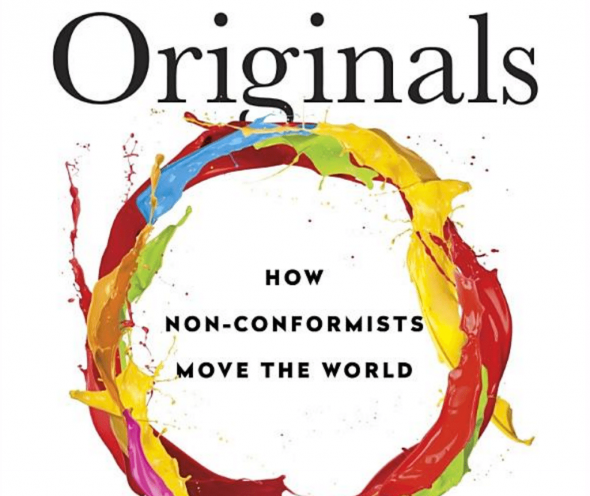In Originals: How Non-conformists Move the World, organizational psychologist and bestselling author Adam Grant explores various studies and provides examples regarding how we view ourselves and disrupt the status quo. Originals is a phenomenal book for entrepreneurs and new business owners. But many new entrepreneurs are too swamped with the logistics of starting a new venture to set aside time to read, so here are five key takeaways from the book.
1. You don’t need to take extreme risks.
Many entrepreneurs believe that they must take extreme risks when starting a new venture. However, Grant provides numerous examples that “debunk the myth that originality requires extreme risk-taking.” He states that successful entrepreneurs are not risk-takers; they are “risk-mitigators.”
Successful brands and companies performed best when testing novel innovations while hedging their overall performance with stable positions. Individuals can do the same by pursuing riskier ventures while ensuring they are not risking their entire livelihoods.
2. Stop trying to find the perfect idea.
Another common misconception about entrepreneurs is that they require the perfect idea to be successful. However, Grant demonstrates that “creative geniuses” do not labor over perfecting a single idea. The best innovators produce a massive amount of ideas. By doing so, there are greater odds for at least one of those ideas to be a winner.
One warning regarding this idea generation process is that individuals often develop a bias towards their ideas. They gravitate towards familiarity as it is instinctual to reject something novel. “[In] reality, the biggest barrier to originality is not idea generation—it’s idea selection,” explains Grant.
3. Timing is of utmost importance.
“Life is timing” was the lyrics in some Korean drama series I watched. It could not be more true when it comes to the success or failure of businesses.
Bill Gross of Idealab revealed that “[timing] accounted for forty-two percent of the difference between success and failure.” Timing trumped other factors such as the “uniqueness of the idea, the capabilities, the execution of the team, the quality of the business model, or the availability of funding.”
This finding is a tough pill to swallow because the above factors are elements we have influence over. When it comes to timing, we may have no control. Grant leaves his readers on a more encouraging note. “Being original doesn’t require being first. It just means being different and better.”
4. If it’s all in your head, you’re going to get old.
Grant describes the conceptual versus experimental styles of innovation. Conceptual innovation involves forming an idea in one’s head and then carrying out that idea. Experimental innovation takes a prototype and puts it through a rigorous process of trial and error. This concept is similar to a lean model. Entrepreneurs can take a minimum viable product (MVP) and test it in the market. They can take actual feedback and make improvements or pivot.
The above is not a novel concept in entrepreneurship and innovation. Grant provides additional insight by warning his readers that “[conceptual] innovators tend to generate original ideas early but risk copying themselves.” He expounds upon the latter style in that “[to] sustain our originality as we age and accumulate expertise, our best bet is to adopt an experimental approach.”
5. Just chill out, sometimes.
Entrepreneurs do not take easy paths in life. The very act of disrupting and innovating the status quo can cause much tension with others. Pursuing riskier ventures and testing novel ideas is an unsettling process. There will inevitably be “failures, barriers, and setbacks along the way.”
Grant equips entrepreneurs with two frames of mind: strategic optimism and defensive pessimism. Entrepreneurs who are in an explorative stage should be open and adopt a posture of strategic optimism. “When we’re not yet committed to a particular action, thinking like a defensive pessimist can be hazardous.” However, once you set your mind on achieving a particular goal or task, it is best to think like a defensive pessimist and tackle any doubts or fears head-on. Shifting between these two states of mind at the appropriate time will enable entrepreneurs to be chill when necessary and fired up when it’s time to go.
These five vital lessons don’t do justice to the wealth of wisdom found in Adam Grant’s Originals. Hopefully, this sample will encourage the busy entrepreneur to pick up the book to see what additional advice Grant offers.
Just remember, take calculated risks, generate numerous ideas, let timing do its thing, experiment, and chill out, sometimes.
There are links on this site that can be defined as “affiliate links”. This means that we may receive a small commission (at no cost to you) if you subscribe or purchase something through the links. You can read our full affiliate disclosure here.














Pingback: Believe In Your BUSINESS Skills But Never Stop Improving ·
Pingback: 5 Lessons for Entrepreneurs from Adam Grant’s Originals - Amazon FBA Courses